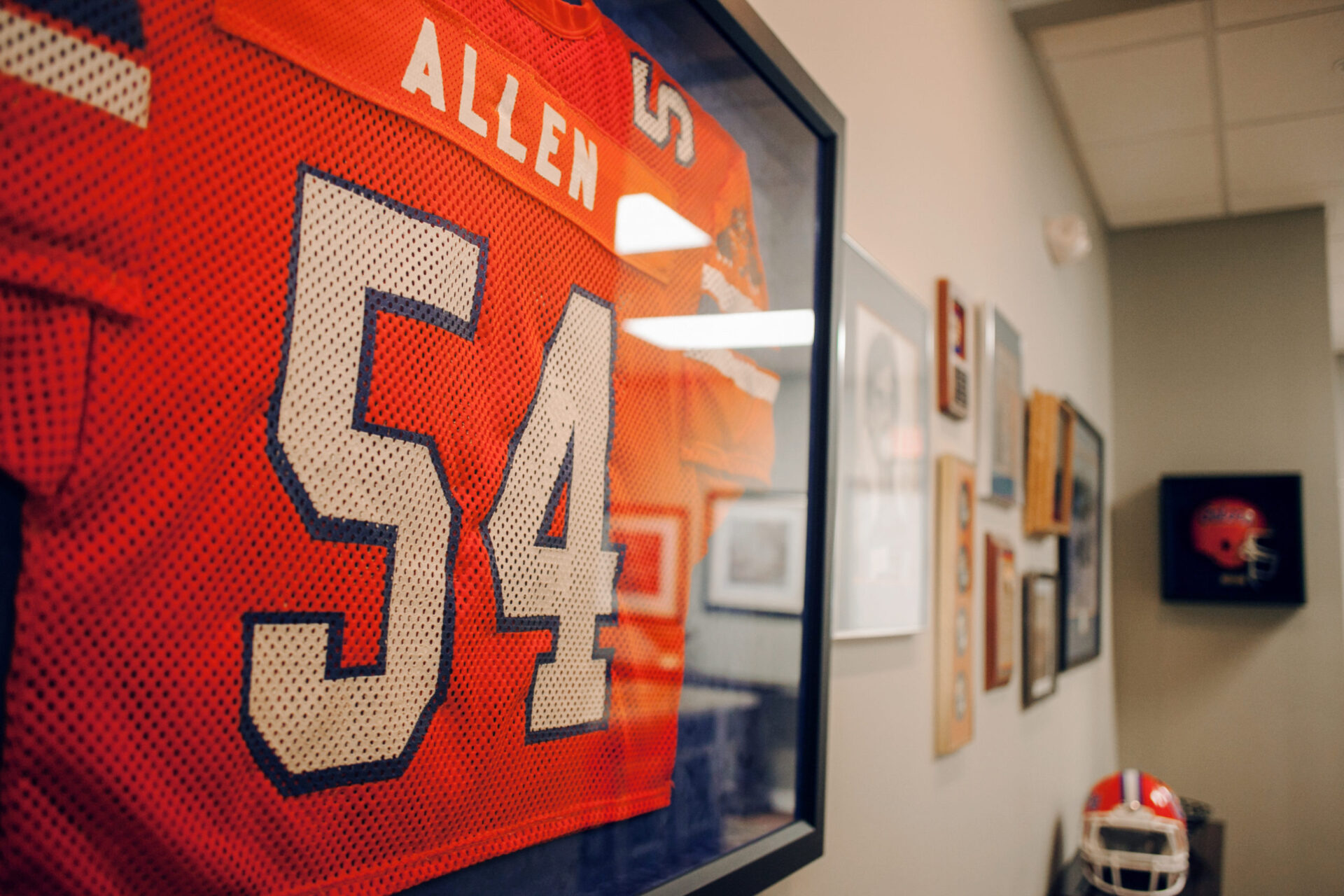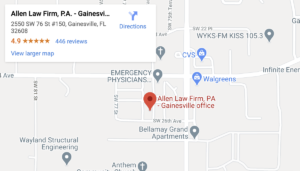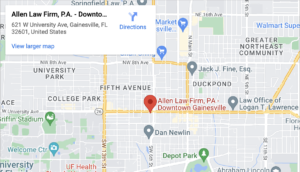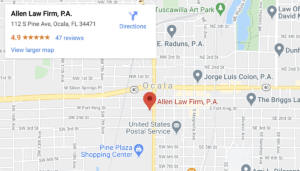When Should I Hire an Ocala Personal Injury Lawyer?

You should hire an Ocala personal injury lawyer in many different situations, depending on the facts of your case. Because of the contingency fee structure that most personal injury lawyers use, an attorney has no incentive to exaggerate the size of your claim or your need for a lawyer. Therefore, you should schedule a free initial consultation to determine whether you need legal representation.
See the discussion below for a more specific discussion of when you may need to hire a lawyer.
You Have a Large Claim for Damages
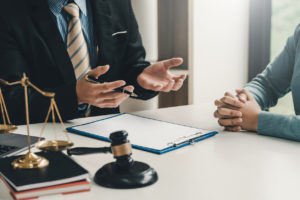
Conflict tends to erupt when a large amount of money is at stake. If you are claiming $2,000 in damages, you won’t meet nearly as much resistance as you would if you claimed $200,000.
If you know you have a large claim (you suffer catastrophic injuries, for example), start looking for a lawyer immediately. If you don’t know how much your claim is worth, gather all the evidence you have and schedule a free initial consultation with an experienced personal injury lawyer.
How Pain and Suffering Can Increase the Value of Your Claim
Pain and suffering damages are major wild cards in many personal injury claims. Suppose you have experienced significant pain and suffering due to your injury. In that case, your claim for pain and suffering could amount to more than every other economic component of your claim combined (medical bills, lost wages, etc.). Since pain and suffering is so subjective, the efforts of a skilled personal injury lawyer could make a massive difference in the amount of money you receive.
You Need to File a Personal Injury Lawsuit
There is more than one reason why you might want to file a lawsuit, even if you still hope to settle your claim without a trial:
- The statute of limitations deadline is approaching, and your claim will die unless you file a lawsuit before the deadline passes.
- You want to pressure an opposing party who refuses to issue a fair settlement offer.
- The opposing party has possession of critical evidence, and you need the pretrial discovery process to force them to hand it over.
There is paperwork involved in filing a lawsuit, and if the amount of your claim exceeds $8,000 (including costs, interest, and attorney’s fees), you cannot file a small claims lawsuit. You will have to file a personal injury claim. Have your lawyer draft the paperwork for you because the rules are complex, and your claim could face dismissal if you make an error.
You Need Help With the Pretrial Discovery Process
You must file a lawsuit to gain access to the pretrial discovery process. In pretrial discovery, you demand access to specific evidence in the defendant’s possession. If the defendant refuses to cooperate, the court can impose sanctions. The defendant can make corresponding demands on you.
Discovery offers the following legal weapons:
- Interrogatories: Written questions that the opposing party must answer under oath.
- Depositions: The parties can ask each other questions to elicit testimony under oath. This process does not occur in court, and the judge is usually absent. The testimony you receive through questioning could become valuable evidence.
- Requests for production: A request for production demands that the opposing party allow the requesting party to examine specific evidence, such as documents and physical evidence.
- Requests for admissions: Each party asks the other party to admit to certain facts. This exchange can simplify the dispute for both sides.
Evidence you gain through pretrial discovery might tip the scales enough to persuade the defendant to settle on your terms. If not, you could still win at trial.
You Need to Draft a Settlement Agreement
Every final settlement to a personal injury claim should be memorialized in a written settlement agreement. Settlement agreements are binding legal contracts that you must draft with utmost care. Don’t download a template from the Internet, and don’t sign a settlement agreement drafted by the opposing party until your lawyer reviews it. Better yet, have your lawyer draft the agreement.
The Accident Was Partly Your Fault
Many accidents are the fault of more than one person. For example, in a slip and fall accident, the defendant failed to dry the stairs that you slipped on, but you were intoxicated at the time. In that case, you may both share part of the blame for the accident.
Under Florida’s modified comparative negligence system, a judge will assign you a percentage of fault and deduct that percentage from your awarded damages. If you were 30% at fault, for example, a court would deduct 30% from your damages. If you were 51% or more at fault instead, you cannot recover any damages at all. These rules leaves the opposing party, usually an insurance adjuster, with every motivation to blame you for the accident. An experienced personal injury lawyer knows how to fight back.
Your Claim Involves Significant Scientific or Technical Complexity
Certain types of claims are complex by their very nature. For example, medical malpractice cases and claims for injuries suffered from defective products tend to be complex. You will probably need the assistance of a personal injury lawyer and an expert witness to ensure that the jury understands your claim.
You Suffered Long-Term Injuries
If you suffered long-term or permanent injuries from your accident, you are going to experience difficulty estimating your future medical expenses and diminished earning capacity.
The stakes are high because if you run out of money someday, you can’t come back to court and ask for more. You will need an experienced personal injury attorney and perhaps an expert witness to calculate the total value of your claim.
You Are Suing the Government
The rules differ when you sue the government for damages because the money comes from the taxpayers’ pockets. There is a lot of extra red tape, and you are subject to tighter deadlines. A lawyer with experience suing the government is essential.
You Are a Parent Suing on Behalf of Your Child
A child under 18 years old cannot file a lawsuit in Florida, even to enforce their own personal injury claim. However, a parent or guardian can file a lawsuit on their behalf. Emotions can run high when you are suing someone for injuring your child, and rationality can go out the window. A lawyer can serve as a stabilizing influence to ensure you make effective decisions.
You Are Suing for Wrongful Death
If the accident victim dies from their injuries, their personal injury claim dies with them. Nevertheless, a wrongful death claim arises in favor of the deceased victim’s probate estate.
The executor of the estate must file the lawsuit. These lawsuits tend to be emotional, with high stakes involved. Wrongful death law also differs significantly from personal injury law. All of these factors call for the involvement of a lawyer.
Schedule a Free Consultation to Determine If You Need to Hire an Ocala Personal Injury Attorney
Contact an experienced Ocala personal injury attorney from Allen Law Firm, P.A. at (352) 351-3258 if you need help resolving your claim. Most attorneys offer free initial consultations and zero legal fees unless they win your case, so it’s best to reach out for help and see if you need legal representation.
